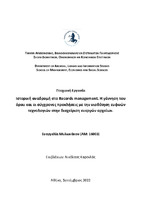| dc.contributor.advisor | Καρεκλάς, Νικόλαος | |
| dc.contributor.author | Μυλωνάκου, Ευαγγελία | |
| dc.date.accessioned | 2022-10-11T06:20:49Z | |
| dc.date.available | 2022-10-11T06:20:49Z | |
| dc.date.issued | 2022-09-22 | |
| dc.identifier.uri | https://polynoe.lib.uniwa.gr/xmlui/handle/11400/3037 | |
| dc.identifier.uri | http://dx.doi.org/10.26265/polynoe-2877 | |
| dc.description.abstract | Η παρούσα εργασία παρουσιάζει τριμερή διάρθρωση. Το πρώτο μέρος της αφορά στην
ιστορική αναδρομή του Records management. Το τμήμα αυτό της εργασίας αναφέρει
την καταγραφή αρχείων από το 7.000 π.Χ., οδηγεί στην ελληνική αρχαιότητα και τη
Βυζαντινή αυτοκρατορία για να φτάσει στα Βενετικά και τα Οθωμανικά αρχεία.
Παρουσιάζεται η έννοια και η φύση των αρχείων και διαχωρίζονται τα ενεργά από τα
ιστορικά αρχεία. Στη συνέχεια, αναλύεται ο όρος του Records management. Η
πληροφορία είναι ένα κοινωνικό αγαθό και η διαχείριση των αρχειακών τεκμηρίων
διαιρούνται σε δύο θεωρητικές και σε δύο πρακτικές προσεγγίσεις, την αγγλοσαξονική
προσέγγιση (Records Life Cycle), η οποία αποτέλεσε το ερέθισμα για να δημιουργηθεί
μια ακόμη προσέγγιση που δημιουργήθηκε στην Αυστραλία (Continuum Model). Και
τέλος, η σύγχρονη κοινωνία επιβάλλει την καταγραφή της πληροφορίας στο ψηφιακό
περιβάλλον και τούτο είναι το τρίτο μέρος της εργασίας, οι σύγχρονες προκλήσεις και
η υιοθέτηση ευφυών τεχνολογιών στη διαχείριση των ενεργών αρχείων. | el |
| dc.format.extent | 74 | el |
| dc.language.iso | el | el |
| dc.publisher | Πανεπιστήμιο Δυτικής Αττικής | el |
| dc.rights | Αναφορά Δημιουργού - Μη Εμπορική Χρήση - Παρόμοια Διανομή 4.0 Διεθνές | * |
| dc.rights | Attribution-NonCommercial-NoDerivatives 4.0 Διεθνές | * |
| dc.rights | Attribution-NonCommercial-NoDerivatives 4.0 Διεθνές | * |
| dc.rights.uri | http://creativecommons.org/licenses/by-nc-nd/4.0/ | * |
| dc.subject | Records management | el |
| dc.subject | Αρχεία | el |
| dc.subject | Records life cycle | el |
| dc.subject | Continuum model | el |
| dc.subject | Ενεργά αρχεία | el |
| dc.title | Ιστορική αναδρομή στο Records management. Η γέννηση του όρου και οι σύγχρονες προκλήσεις με την υιοθέτηση ευφυών τεχνολογιών στην διαχείριση ενεργών αρχείων. | el |
| dc.title.alternative | Historical review of Records management. The birth of the term and the modern challenges with the adoption of intelligent technologies in active records management. | el |
| dc.type | Πτυχιακή εργασία | el |
| dc.contributor.committee | Koulouris, Alexandros | |
| dc.contributor.committee | Giannakopoulos, Georgios | |
| dc.contributor.committee | Kouis, Dimitris | |
| dc.contributor.faculty | Σχολή Διοικητικών, Οικονομικών & Κοινωνικών Επιστημών | el |
| dc.contributor.department | Τμήμα Αρχειονομίας, Βιβλιοθηκονομίας και Συστημάτων Πληροφόρησης | el |
| dc.description.abstracttranslated | This thesis presents a three-part structure. The first part deals with the history of records
management. This section of the thesis mentions on the recording of archives from
7,000 BC, leading to Greek antiquity and the Byzantine Empire to the Venetian and
Ottoman archives. The concept and nature of files is presented and active and historical
files are distinguished. Next, the term Records management is discussed. Information
is a social good and the management of archival records is divided into two theoretical
and two practical approaches, the Anglo-Saxon approach (Records Life Cycle), which
was the stimulus for another approach created in Australia (Continuum Model). And in
the end, modern society requires the recording of information in the digital environment
and this is the third part of the paper, the modern challenges and the adoption of
intelligent technologies in the management of active records. | el |



